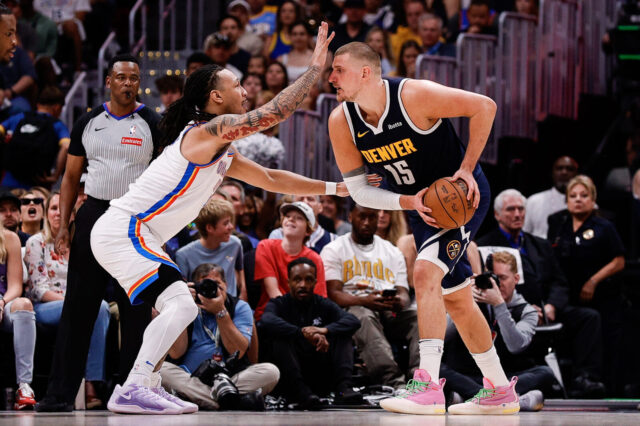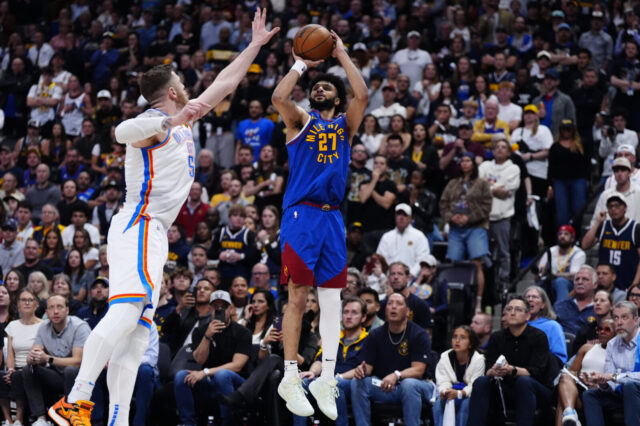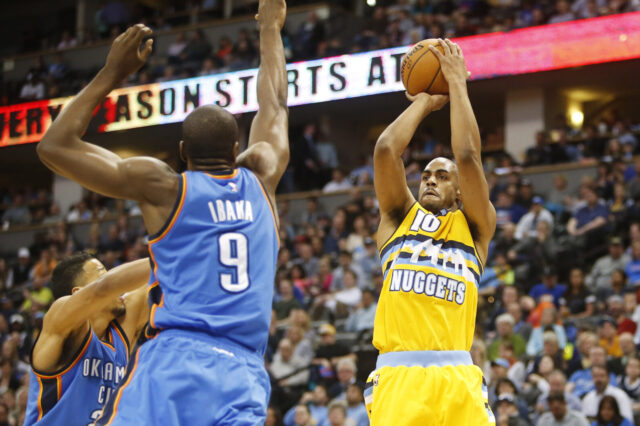In late June last summer, our Denver Nuggets had sincere and serious visions of a return to the NBA Playoffs, after missing the league’s post-season dance for the first time in 11 years. Such conviction led to the re-acquisition of Arron Afflalo (who turned 29 in mid-October), one of the league’s more solid – if not spectacular – shooting guards, albeit at the expense of a tantalizingly-talented-but-raw two-guard talent in Evan Fournier (who turned 22 in late October).
If you believed (at the time) that the Nuggets actually had a legitimate chance of returning to the post-season, then you too would have made this trade. After all, having completed his seventh NBA season – and his second in Orlando since being shipped by the Nuggets to the Magic in the 2012 four-team Dwight Howard / Andre Iguodala / Andrew Bynum / Jason Richardson / Al Harrington / et al blockbluster trade – Afflalo had admirably increased his per game scoring average in every season of his career, capping out at near All-Star worthy 18.8 ppg in 2013-14 for the Magic, while Fournier had only shown flashes of potential with little consistency here in Denver.
Despite Afflalo having a more bonafide NBA resume than Fournier, the trade was still a gamble for the Nuggets – thanks largely to Afflalo having a player option final year from the contract he signed in Denver in 2011, paying him about $7.6 million this season and due to pay him about $7.8 million next season should Afflalo exercise his option through the 2015-16 season. But after the Nuggets started 2-8 to open the 2014-15 season – with Afflalo struggling in most of those games, including a 0-4 shooting night against the Cleveland Cavaliers and a 1-4 outing against the Sacramento Kings in that span – the trade had the makings of a mistake for Denver. Meanwhile, the much younger (and much less expensive) Fournier opened the season with 14 consecutive games of 10-plus point production, including seven 18-plus point games. Afflalo and the Nuggets collective struggles, combined with Fournier’s solid play in only his third NBA season, made last summer’s trade look even more questionable.
Now nearly halfway through the 2014-15 season, Afflalo has settled in with a semi-respectable 15.5 ppg (I say "semi-respectable" given that less is asked of Afflalo offensively in Denver than was asked of him in Orlando) while Fournier, whose minutes have been reduced as Magic two-guard Victor Oladipo's minutes have increased, is averaging 13.6 ppg off the Magic bench. Afflalo (44.7%) shoots the ball from the field slightly better than Fournier (42.9%), but Fournier (37.2%) is out-shooting Afflalo (34.6%) from three-point range … which is especially unfortunate as just a few seasons ago here in Denver Afflalo made over 40% of his three-point attempts and made nearly 43% of them in Orlando last season, sixth-best in the entire NBA.
But this column isn’t meant to debate the Fournier-for-Afflalo trade. I think most Nuggets fans – had they known the Nuggets would be 17-20 through 37 games and an extreme long shot (at best) to make the 2015 playoffs – want that one back. The issue at hand with Afflalo now is two-fold. 1) Do the Nuggets keep Afflalo for the remainder of the 2014-15 campaign, knowing he might exercise his right leave at season’s end? Or, 2) Do the Nuggets trade Afflalo now, given that his 15.5 ppg and veteran experience are sure to be sought after by more than a handful of playoff contenders? (As is being reported by ESPN’s Ramona Shelburne, citing interest from the Miami Heat, Los Angeles Clippers and Charlotte Hornets to date. Other suitors will surface soon.)
Hence, the Arron Afflalo conundrum.
Making matters more interesting / complicated is the timing of Afflalo's contract itself. While under "normal" NBA circumstances Afflalo would likely opt-out of the deal at season's end and grab hold of a four- or five-year deal with the Nuggets or someone else, to do so he'd miss out on what's assumed to be the greatest one-year increase of the NBA's salary cap in league history come 2016. The NBA's new television deal with ESPN/ABC and TNT, which kicks off with the 2016-17 campaign, has the league due to receive $2.7 BILLION annually (on average – and not a typo) for nine years, meaning the NBA salary cap could catapult from $63-ish million in 2015-16 to $80-ish million in 2016-17 and $90-ish million beyond that. Point being, Afflalo would be foolish to sign a longterm extension with any team now and forgo the chance at even bigger salary dollars in 2016.
Or would he?
Unfortunately for Afflalo, were he to exercise his option and stay through 2015-16 he'll be hitting the 2016 free agent market as a 31 year old. Not ancient but certainly not exactly a spring chicken by NBA standards. And that doesn't account for the risk of injuries should Afflalo forgo the guarantee of a long-term deal available to him this summer. Moreover, of all the positions in the NBA, shooting guards seem to age the fastest (although Afflalo, not the greatest of natural athletes to begin with, relies more on his footwork and his on-court intelligence than his limited athleticism, so his career could theoretically be prolonged).
So if you're Arron Afflalo, do you opt out of your current contract in the summer of 2015 and re-sign (with Denver or elsewhere) a four- or five-year deal that guarantees you security into your mid-30s? Or do you play out your contract in Denver, collect over $15 million along the way, and test the free agent waters with a much higher salary ceiling but do so as a 31 year old?
And if you're the Denver Nuggets, do you do whatever it takes to keep Afflalo happy and in Denver through 2016? Or, knowing that a rebuild in Denver might be necessary anyway, do you deal Afflalo before the February 19th trade deadline and let his contract become someone else's problem?
Again, the Arron Afflalo conundrum is upon the Nuggets. And they have just over a month to figure out what to do about it.


